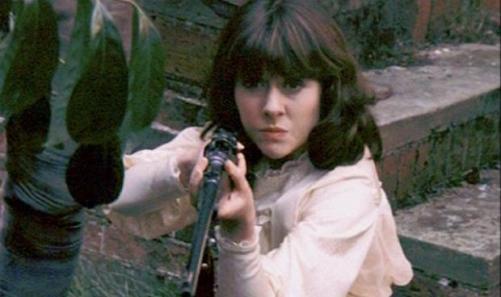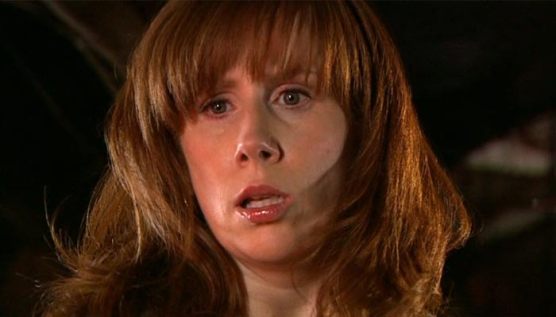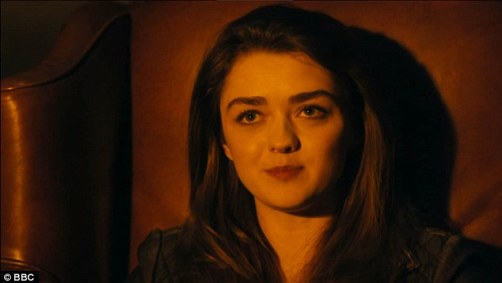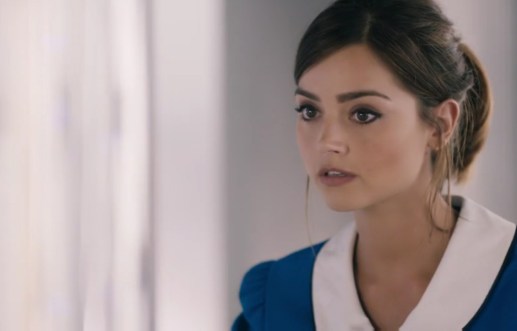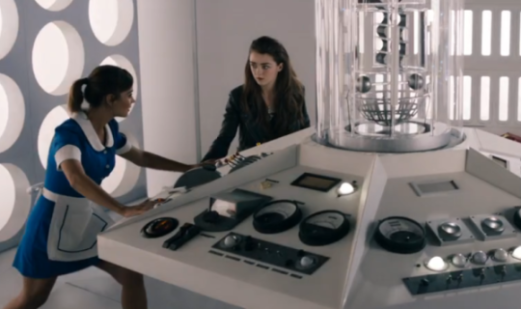Clara and Ashildr in the Diner: Best Doctor Who Companions Ever
Clara and Ashildr: Best Companions Ever
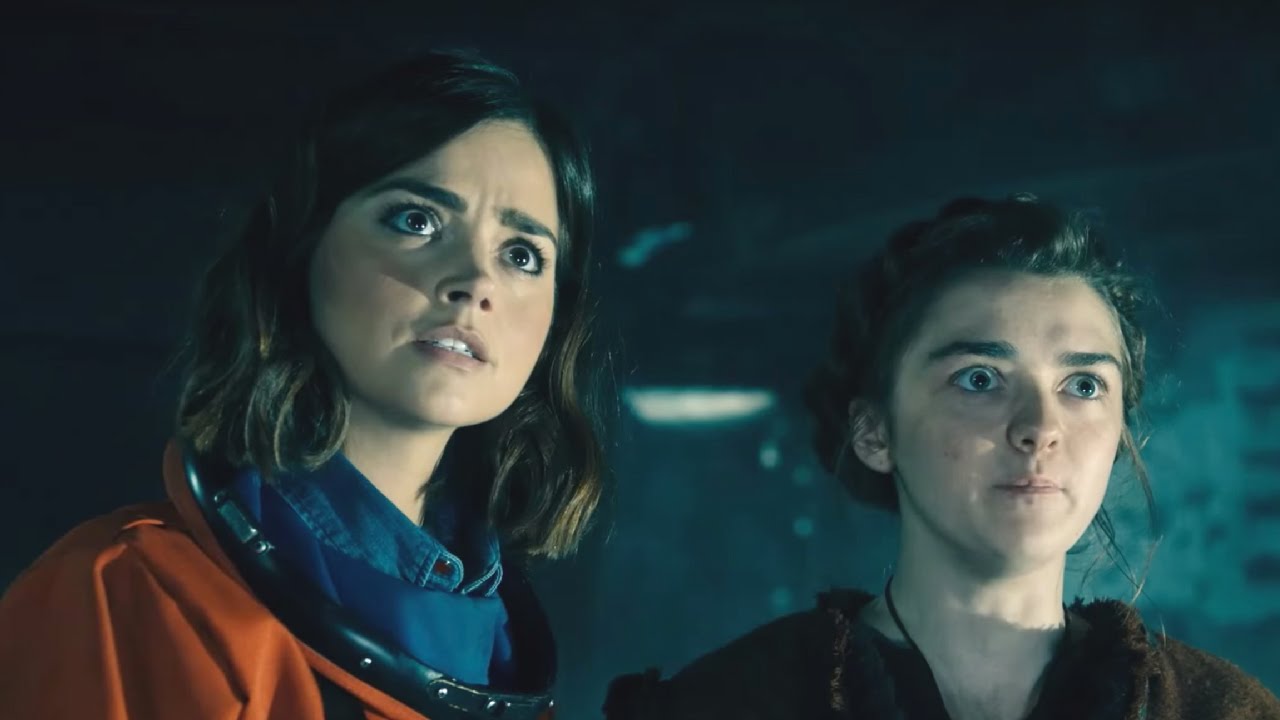
The introduction of Pearl Mackie as Bill has gotten me thinking a lot about what makes a great companion on Doctor Who. For as long as there’s been a Doctor, there have been companions: those people (usually human, sometimes fellow Gallifreyans, sometimes alien, usually female but sometimes male) who join the Doctor on his adventures, either for an episode or a season. They ground him, help him, give him perspective. The best ones have special skills, their own beautifully nuanced personalities, and have the potential to be “Doctors” themselves. No where has this been more apparent than in the creation of Clara Oswald and Ashildr aka “Me.”
Clara and Ashldr are the best companions the Doctor has had so far in the show’s 50+ year history. In fact, it’s as if the entire 50 years were leading up to the possibility of amazing companions like them. But before I get into that, let’s look at what makes a great companion:
Great companions want the Doctor, but don’t need him.
The very first companions, schoolteachers Ian and Barbara, sneak onto the TARDIS to help someone they perceive as an at-risk student (she turns out to be Susan, the Doctor’s whiny granddaughter). Jo, Sarah Jane, and Martha’s careers put them in the Doctor’s path too, and they each decided to work with or travel with the Doctor based on desires for their own lives. Leela, knowing she’s too unreasonable for the responsibility of leading her people, barges onto the TARDIS and starts pressing buttons despite the Doctor trying to take his leave of her, and without giving him a reason as to why she wants to go with him. Romana is sent to the Doctor to help him gather the scattered pieces of the Key to Time, and she’s chock full of the arrogance all students have when they first graduate college and think they’re the first people to have learned anything ever. She’s sure the Doctor needs her more than she needs him.
Donna Noble declines the offer to be the Doctor’s companion at first, happy with her life, only reconsidering after coming to appreciate the bigger picture of the work Torchwood does and realizing she wants a larger role in that beyond that of a temp secretary from Chiswick.
When it comes to leaving the TARDIS, great companions do so on their own terms. Jo, Romana, and Martha, as well as Ian and Barbara (and even Susan) each left of their own volition, choosing their own lives over being at the Doctor’s beck and call.
The best companions go with the Doctor, not because they need fixing, but because they’re taking action in their own lives. They want the experiences life with the Doctor will offer them, but they don’t need the Doctor to complete them. They have their own goals, dreams, talents, and values to do that.
Great companions have faith in the Doctor and understand his importance, seeing beyond themselves.
Faith is such a huge part of what makes a great companion. It means trusting that the Doctor will always have a plan, will always come back, even if it looks like he won’t. The best companions have the Doctor’s back no matter what, and encourage others to do the same, and it’s this faith that keeps the Doctor going, even when he loses faith in himself. It’s basically the fuel for his greatness.
However, a good companion’s faith isn’t blind. It’s the product of lived experience coupled with the rare ability to trust. So often in this world, it’s difficult to trust anyone. Yet this is something that all great companions have the ability to do. Martha basically preaches the gospel of the Doctor by walking the Earth for a year to tell stories about him so that the world can join together and think his name in order to save the world. Amy has her faith in the Doctor tested in “The God Complex,” and replaces the childlike faith she’d had in him since she was a girl with a more adult faith that allows them to go on together.
The faith that great companions have in the Doctor then does something pretty awesome. They find that faith in themselves. Great companions begin to believe that they can do good and help others the way the Doctor does. They begin to understand how big the Universe is, and the myriad problems it contains, but each in their own way, they also see that they can do what the Doctor is doing and help solve them.
Great companions could be the Doctor
The very best companions could easily replace the Doctor. And here’s where things get tricky. I mean, the Doctor’s name is in the title of the show, so one assumes that the show should primarily revolve around him. However, it’s also called Doctor Who, which speaks to a mystery at the heart of him, but also…who’s the Doctor here? Who exactly is the one saving lives? Who truly deserves the title? The best companions make you ask questions like that.
There are also the companions who literally were the Doctor (sort of), if only briefly. Donna was probably the most tragic of these, because “for one shining moment she was the most important woman in the whole, wide universe,” as the DoctorDonna, complete with all the knowledge in the Doctor’s head, and she was prepared to travel in the TARDIS for the rest of her life. Yet, that option was taken away from her: by her human physiology, by the Doctor, and by Russell T. Davies. It was taken away from her against her will in a controversial moment that left many fans squicked.
Something similar happened with Rose in the first season of the Ninth Doctor’s run, when she looked into the heart of the TARDIS, taking it into herself and making herself pretty much a goddess. She brought Jack Harkness back to life, making him immortal; scattered the words “Bad Wolf” across time to lead herself to this moment; and destroyed the Daleks. She could have been all-powerful, and she wanted to hold onto that to help people. But the Doctor told her she couldn’t handle it, taking the energy from the time vortex into himself instead (with a gratuitous kiss).
In both Rose and Donna’s cases, these women briefly had the power of the Doctor, his knowledge of all of space and time. And in both cases, they were robbed of the opportunity to have that power for too long, probably because Russell T. Davies didn’t want to accidentally write the Doctor out of relevance. Otherwise, using the whole “puny human brains can’t handle all that knowledge” nonsense as an excuse to take that power away is absurd.
And we can see how absurd it is when we see the simple, yet elegant solution Steven Moffat came up with once he took over as showrunner and created an amazing character.
Ashildr
How do you solve a problem like Donna (or Rose)? You give her a pen and paper.
Ashildr, who later simply refers to herself as Me the longer she’s alive, didn’t choose to have her life interwoven with the Doctor’s. Yet, when she was dying, the Doctor was able to bring this kind, brave, creative storyteller back to life using alien technology. Funny thing, though. He accidentally made her immortal, like a vampire without the bloodlust.
She desperately wants to travel with the Doctor the second time she encounters him in “The Woman Who Lived,” already bored with what the world has to offer and unable to wait around for a time when it doesn’t take days or weeks to travel anywhere in a horse-drawn carriage. The Doctor doesn’t want to take her with him, not because she can’t handle it, but because he can’t. She reminds him too much of himself.
She ends up living to see the end of everything along with the Doctor, crossing paths with him intermittently throughout those centuries, and she ends up seeing herself as a sort of “anti-Doctor.” After all, someone has to take care of people after the Doctor’s left them. Ashildr knows that the Doctor protects humanity, but positions herself to protect humanity from the Doctor. She becomes “the Patron Saint of the Doctor’s Leftovers.”
As she continues to live, century after century, she forgets more and more of her past — infinite life span, limited brain space. So what was her solution? She started keeping records. Piles of journals accumulated over time as she recorded the fullness of her experiences. Obviously, acquiring more and more information as time passes is not the same as having all of time and space plopped into your brain all at once…but it does make one wonder why in the cases of Rose and Donna the option of “downloading” was never brought up. It’s a sci-fi show. Our bodies create electricity. It’s interesting that someone with the Doctor’s knowledge didn’t at least attempt to preserve both the women and the power they had access to, especially since it was what they both wanted.
I see the Russell T. Davies companions as a warm-up for the amazing companions we finally got under Moffat. Say what you will about “magical pregnancies,” Amy Pond is a great character who had the kind of story arc that is usually reserved for a male character. And then we got Clara and Ashildr, who are just the best female characters this show has ever had. Perhaps the show’s audience, or the show’s writers, weren’t ready for female characters who could actually, truly outshine the Doctor before this most recent season of Doctor Who, but I’m glad they seem to be now.
Ashildr was not only the Doctor’s match, she surpassed him. When the Doctor encounters her at the end of time, she’s much older and more experienced than he could ever be. She finds the place where she fits, setting herself up to compliment him, not as his enemy. You protect them from the dangers of the universe, I protect them from you. And she says this without malice. She simply knows the Doctor. She believes in him, but her faith isn’t blind.
Finally, after several companions who weren’t allowed to see being Doctor-like through, Ashildr was allowed to reach the end of time in tact, as wholly herself as ever she was. And after all that, she was finally rewarded with travel in the TARDIS (well, a TARDIS)…alongside Clara.
Clara
I hated Clara at first. She started life on Doctor Who as “The Impossible Girl,” first as a human trapped and assimilated by the Daleks, then as a puzzle for the Doctor, scattered throughout time. I hated that she seemed to exist solely as something for the Doctor to piece together, having zero personality of her own save some generic flirtatiousness. However, as her story continued, she became more and more nuanced, and she became the best companion the show has ever had. Yeah, I said it. The best.
She’s the best, despite the fact that she was done a huge disservice by having her story arc spread out over too much time, with seasons and episodes airing too far apart. Clara is a companion designed for a binge watch. A companion so rich, and complicated, and wonderful that it isn’t really until you see her whole story that you appreciate how amazing she is. She’s like an impressionist painting. Look at any one aspect of it, and all you see are brushstrokes or dots. Examine the whole at once, and you see a masterpiece.
Clara loved traveling with the Doctor, but she also loved teaching, and her life at home. Rather than traveling with the Doctor full-time at the expense of her “real life,” she took weekly trips with him, always returning in time to get back to her people and obligations. She fell in love with a fellow schoolteacher (and former soldier) Danny Pink, eventually roping him into her life with the Doctor, to his eventual peril.
It’s in Season Eight that Clara really comes into her own, specifically in “The Name of the Doctor,” when we finally discover the secret behind “The Impossible Girl.” What’s interesting is that, just before we see how important she is and has always been to the Doctor, we see her at her least special. In a cosmic conference call with Madame Vastra, Jenny, Strax, and River Song, Clara is flat-out told how not special she is. When discussing how the Doctor doesn’t tell anyone his biggest secrets, Vastra cautions Clara against “entertaining the idea that she’s the exception.”
We then learn that she is the exception. To everything. She was literally born to be the Doctor’s best companion, existing to throw herself into the time stream to continually save the Doctor across his entire timeline.
Now, this fact might spoil her for some people, much in the same way that I wasn’t crazy about her for simply existing as a mystery for the Doctor to solve at first. However, her life’s purpose in no way takes away from her humanity, nor does it prevent her from asserting her own wants and needs. In fact, it’s because she exists for this purpose that she’s able to keep the Doctor in perspective.
Whereas River Song has spent her life trying to match the Doctor, devoting herself to pursuits that would always put her in his orbit, putting him on too-high a pedestal, Clara never needed to. She just was his match. She learns that it’s always her job to save him, mostly from himself, and when you know that it’s your job to protect one of the most feared beings in the Universe, it’s easier to see their flaws.
What’s interesting is that, throughout time, Clara has held jobs that involve her caring for children: governess, teacher, babysitter…is the Universe telling Clara that preparing to protect the Doctor is like taking care of a big child? She kept coming back around to souffles. Is the Doctor a temperamental, labor-intensive sweet that is difficult to master, but if handled well is quite possibly the best thing you’ve ever tasted? Clara is basically an expert at caring for particularly delicate and volatile things and people, and one of those is the Doctor. But he is one of many, along with children and souffles.
Clara’s brilliance comes through especially when standing alongside someone like River. River is a child of the TARDIS, born to companions and growing up to be romantically involved with the Doctor. She was pretty much designed to be a super-companion, and yet as cool a character as she might be, and as swooningly romantic as her final scene with the Twelfth Doctor was on their last date, she tries too hard.
It’s as if she’s lived her whole life trying to prove herself worthy of the Doctor. It isn’t simply that she exists for the Doctor, but she’s designed her whole life around him. She became an archaeologist to find the Doctor. She fashioned herself into a female Indiana Jones-type adventurer in heels because she knew that it would be her best chance at coming in contact with the Doctor. Even in those long stretches when she’s not with him, everything she does is for him. There is no “herself.”
Meanwhile, even though Clara was “born to save the Doctor,” she’s always been her own person. When she’s not with the Doctor, she’s living her life. Telling her students what a great kisser Jane Austen is. (She mentions her at least twice, if not more. Seriously, they are such a thing!)
That said, she has feelings for the Doctor that go beyond mere romance. There’s nothing sexual, or selfish about it. It’s love in the truest, deepest sense. After she loses Danny, and after the Doctor regenerates from Eleven to Twelve, Clara says goodbye to the Doctor in the only way that makes sense for her — by protecting him. She lies and tells him that Danny is still alive and that she’ll be fine. Meanwhile, the Doctor thinks he’s protecting her by lying to her and telling her that he’s going back to Gallifrey. They are two of a kind.
And they can’t stay away from each other. Again, there’s nothing romantic or sexual here, but Clara and Twelve are fundamentally alike, despite the myriad differences between them.
Before willingly accepting death in “Face the Raven,” she commands the Doctor to stay true to the better side of himself. “You don’t be a warrior. Promise me. Be a Doctor.” First, because she doesn’t want him to turn into a monster over her, and second, because she knows him so well that she knows any attempts at vengefulness will be half-hearted anyway. “Your reign of terror will end with the sound of the first crying child, and you know it.” Even as she’s sacrificing herself (not even for the Doctor, but so that a friend can get back to his daughter), she’s in a position to give the Doctor orders. And he listens.
Later, the Doctor is compelled to break every rule of time and space to try and save her life. So, Clara saves him again by enduring the pain of the Doctor not remembering her. She sees the bigger picture, and is willing to not be special to the Doctor anymore in order to bring him back to himself and help him be the Doctor he’s supposed to be. Other companions are in it for the adventure, or to feel unique, loved, special. Clara is genuinely in it for the Greater Good, and the Greater Good means that the Doctor has to be around to continually save the Univerese.
But then, like the Doctor, she finds a loophole. When the Doctor rushed her to the End of Time to cheat death, she was trapped in the moment between heartbeats, the last one before death. Her body has stopped, and she will only die once she returns to Gallifrey and closes the loop. So….she decides to “go the long way ’round,” and with Ashildr as her companion, they fly off in a TARDIS that looks like a diner.
Clara and Ashildr are companions so good that they get to try their hand at being the Doctor now. They are the evolution of all the amazing qualities of the companions that came before them, and through them we see what’s possible. We don’t have to write companions the way they’ve always been written. The Formula can be added to or changed, and as long as they don’t need the Doctor to define their worth, have faith in the Doctor and in themselves, and are allowed full autonomy, companions can only get better from here!
—The Mary Sue has a strict comment policy that forbids, but is not limited to, personal insults toward anyone, hate speech, and trolling.—
Follow The Mary Sue on Twitter, Facebook, Tumblr, Pinterest, & Google+.
Have a tip we should know? [email protected]

